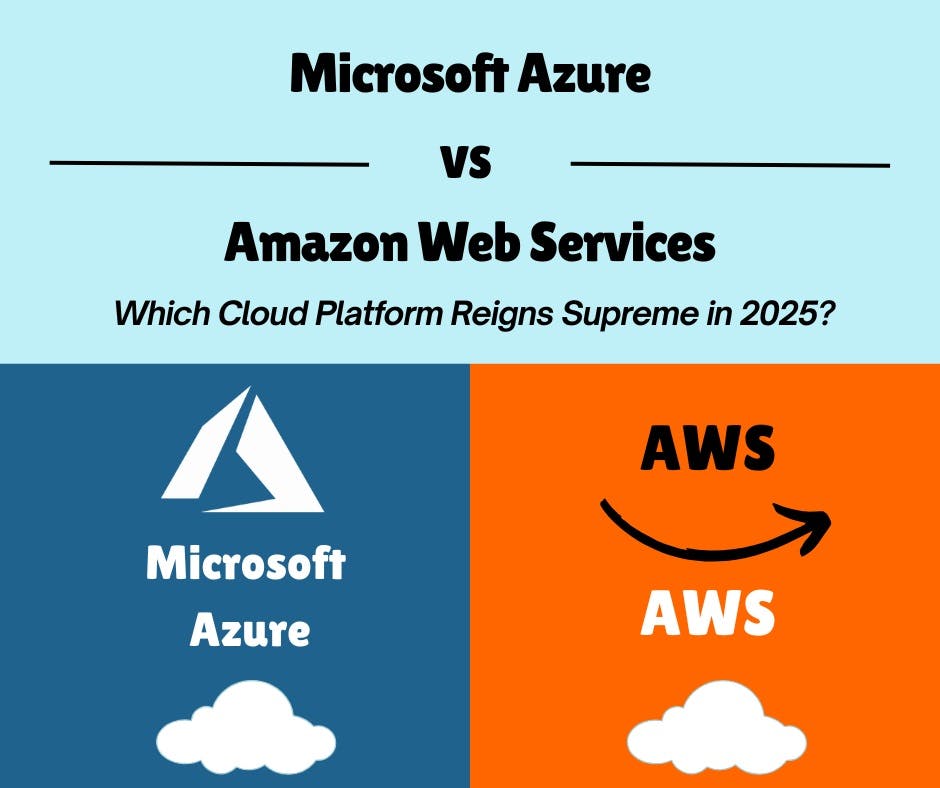Microsoft Azure vs AWS: Which Cloud Platform Reigns Supreme in 2025?

In today’s hyper connected and highly competitive digital space, enterprise innovation continues to depend on cloud computing as the central technology. However, Microsoft Azure, along with Amazon Web Services (AWS), have maintained their position as the market leader in cloud services in 2025 by providing advanced solutions suitable for various enterprise needs. The platforms demonstrate considerable growth, but their separate capabilities attract customers from distinct market sections.
What is Microsoft Azure?
Azure is a cloud-based computing platform built by Microsoft that offers a variety of services that mix analytics and storage with network and computer capabilities. It provides automatic integration with Microsoft products, including Active Directory and Windows Server, as well as Office 365, which attracts enterprises that are heavily invested in Microsoft solutions. Azure is still accelerating its rapid growth rate in 2025, driven by its hybrid cloud capabilities, enterprise security features, and expanding support for AI, machine learning, and DevOps tools.
What is Amazon Web Services (AWS)?
Amazon Web Services, launched in 2006, became the first company to deliver cloud computing solutions to the market. AWS provides its customers with a wide choice of infrastructure-as-a-service (IaaS), platform-as-a-service (PaaS), and software-as-a-service (SaaS) solutions. It has become a widely accepted solution that delivers scalability, a vast service catalog, and an innovation pace, which attracts startups, large enterprises, and government agencies alike. AWS has maintained its top market position in 2025 by investing strongly in AI/ML technology alongside edge and quantum computing.
Choosing the Right Platform in 2025: What Matters Most?
1. Business Needs Over Brand
The choice of a better cloud platform depends on how well it meets your business objectives instead of which one is superior. A business that depends on Microsoft technology solutions should choose Azure since it proves both more cost-effective and efficient. Business operations that require quick service expansion along with diverse options tend to choose AWS instead of alternative cloud solutions.
2. Hybrid and Multicloud Are the Norms
There has been a substantial move toward hybrid and multicloud strategies throughout 2025. While both AWS and Azure support these deployments, hybrid solutions benefit from Azure more due to its early development of Azure Arc and Stack. Even so, many groups choose to combine both platforms when they want to maximize advantages by leveraging their respective strengths.
3. AI and Data Innovation
The two platforms excel in developing their AI capabilities along with their data services. The collaboration between Azure and OpenAI created a strong enterprise AI presence, but the deep-learning capabilities of AWS remain dominant in the market of cloud-native AI tools. The Azure platform delivers AI solutions within comprehensive business operations through its Power Platform and Dynamics 365 platforms. AWS provides unmatched options for customized, scalable AI model development services, which attract data scientists strongly.
4. Partner Ecosystem and Support
From ISVs to managed service providers, both platforms have rich ecosystems. The regulated industry, together with the public sector, mostly selects Azure as their solution, yet AWS attracts fast-growing technology firms and emerging startups. Azure succeeds in securing long-term contracts with enterprises mainly through its business connections to healthcare organizations and financial institutions. Developers are attracted to AWS because of its quick service deployment and excellent open-source technology integration.
Conclusion: A Cloud Choice, not a Competition
Both Microsoft Azure and AWS share equal status as winners in 2025 since their selection depends solely on how they suit particular organizational needs and digital strategies. The dual-cloud or multicloud approach proves to be a suitable solution because enterprises can benefit from both platforms effectively. Your ability to help customers navigate their cloud transformation purposes stays strong because you provide both AWS and Azure products as a cloud solutions provider.

